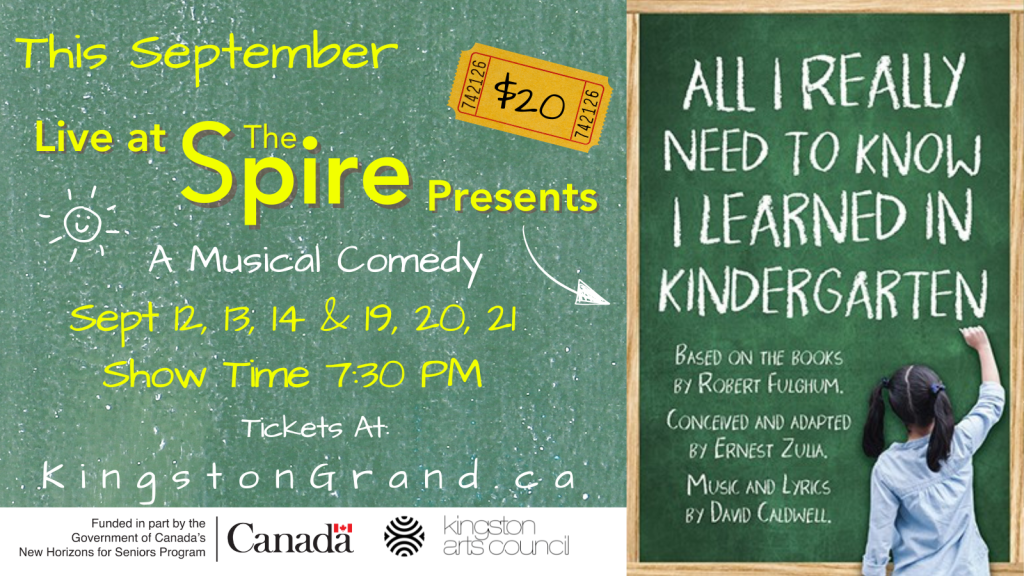Going Back To School with “All I Really Need To Know I Learned In Kindergarten”

Amid the bustle of back-to-school season, a new local theatre club offers a charming take on an old collection of stories. Full of thought-provoking subject matter and peppy performances, The Spire’s Seniors’ Theatre Group presents All I Really Need to Know I Learned in Kindergarten.
Conceived and adapted in 1992 by Ernest Zulia with music by David Caldwell, All I Really Need to Know I Learned in Kindergarten is based on Robert Fulghum’s 1986 book of essays by the same name. While the show is advertised as a musical, it’s not the sort of plot-driven or sung-through affair one might expect from the genre. Instead, as the performers take turns narrating and acting out stories from Fulghum’s essays, it feels almost like a school pageant—a series of quaint scenes and songs that explore big existential themes through moments in ordinary life.
Rosemary Euringer, Sarah Gibson-Bray, John Geddes, Scott Arsenault, and Cindy Chappell first appear on stage as kindergarteners, buzzing with excitement as musical director Michael Capon accompanies them on piano from the side. The actors shift characters throughout the stories, with Capon piping up now and then for some voice-of-God-style cameos. Arsenault’s dynamic facial expressions stand out in the ensemble, as does Geddes’ buoyant depiction of innocent enthusiasm. There’s a comfortable, affectionate energy that comes across in the way the castmates engage with each other, which is a pleasure to witness.
All I Really Need To Know explores everything from dancing pigs to unraked lawns to the yucky stuff at the bottom of the sink that teens (and, per the show, many dads) seem to be allergic to touching. The songs are fun, from the patterful “Uh Oh” to the sweeping “A Tomb With A View”. The sanctuary’s acoustics lend themselves beautifully to choral singing, and there are some sublime harmonies throughout the show, especially in “Reflect the Light”. Though the Spire’s altar is mostly concealed by black curtains, its towering presence can’t help but peek over the stage design—a reminder to anyone who lifts their eyes for a moment that we are gathered in a church.
While the tone is comedic, the stories tread steadfastly on serious subject matter—there’s a lot of death talk, and each section is punctuated with a philosophical takeaway. If the writing feels preachy at times, it comes by it honestly—after the show, a Google search confirmed my guess that All I Really Need To Know was originally the brainchild of a Unitarian Universalist minister. While my sensibilities as a theatre critic weren’t always taken in by the sermonizing style, the show’s commitment to curiosity and engagement with the world touched my heart in a way that felt much needed in a stressful and hectic period of my life. It’s a reminder that, as Fulghum puts it, “I belong to the whole big scheme of things.”
The storytelling is rooted in its own time, and there are moments where generational differences—gender roles, attitudes toward disability—stifled the show’s impact for me. That being said, the values of loyalty, kindness, and sticktoitiveness that permeate All I Really Need To Know I Learned In Kindergarten are a worthwhile inheritance. With a talented and dedicated cast and creative team, the Seniors’ Theatre Group makes a successful debut, reflecting light and laughter from the sanctuary of The Spire.
All I Really Need To Know I Learned in Kindergarten plays at The Spire through September 21, 2024. Tickets and more information can be found here.